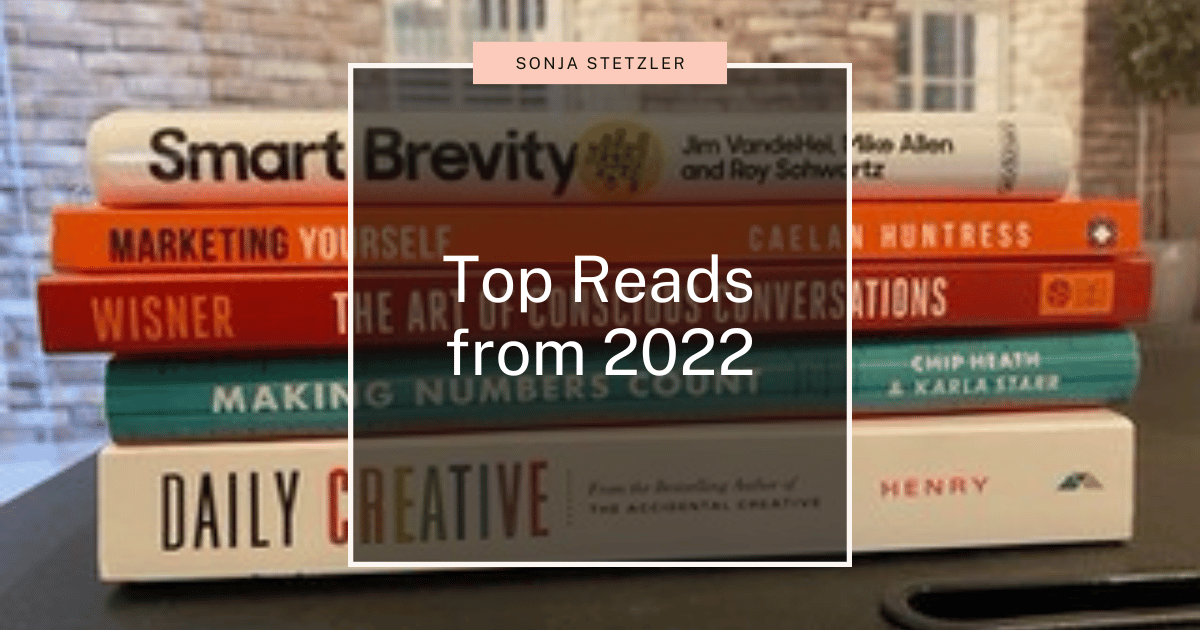My 2022 bookshelf provides inspiration for reflection and life-long learning.
This is the time of year when many of us take the time to reflect on the past year:
- What went well?
- What do I want to change/improve upon in the upcoming year?
- What new goals/experiences do I want to add in the upcoming year?
(A reminder of why reflection is a superpower can be found here: https://hbr.org/2017/09/how-to-regain-the-lost-art-of-reflection).
In light of year-end reflections and life-long learning, I recently ran across a new word that describes me (and perhaps you, too!): tsundoku. It’s the Japanese word for the stack(s) of books you’ve purchased but haven’t read – yet.
According to writer Jessica Stillman, “…people’s unread books push them toward, if not mastery, then at least an ever-expanding understanding of competence. These shelves of unexplored ideas propel us to continue reading, continue learning, and never be comfortable that we know enough.”
Here are my top reads from 2022 (I am not an affiliate for any of the links):
1. Smart Brevity by Jim VandeHei, Mike Allen, and Ray Schwartz.
Conciseness with communication (both verbal and written) is one of the most common challenges my clients struggle with. This book offers the solution to the challenge on how to be heard and provides the ‘secret sauce’ to adapting your communication to how people read and listen. This book is a gem!
2. Marketing Yourself: How to Elevate Your Personal Platform to the Next Level by Caelan Huntress.
Filled with not only Caelan’s wisdom from his many years as a marketer, I enjoyed this book for its practicality, along with exercises and templates. I feel as if I have a better foundation for marketing my practice because of the learnings this book offered.
3. The Art of Conscious Conversations: Transforming How We Talk, Listen, and Interact by Chuck Wisner.
One of my first takeaways from this book was that to improve interaction with others, I first had to become aware of my automatic patterns of behavior – whether it was how I listen or how I react and respond while in a conversation.
Notably important in this book were the reflective questions at the end of each chapter which not only provided me with insights but offered practices for my clients seeking improvements with their communications.
4. Making Numbers Count: The Art and Science of Communicating Numbers by Chip Heath and Karla Starr.
Numbers can be persuasive tools in any presentation; however, they can be more useful if they are relatable to your audience. Another one of my favorite reads of this year, the authors of this book provide numerous examples of how to make your numbers (statistics, percentages, etc…) more understandable and more meaningful to make your messaging more powerful.
5. Daily Creative: A Practical Guide for Staying Prolific, Brilliant, and Healthy by Todd Henry.
OK, I haven’t read this book, yet. I will start this book on January 1st as the book offers a daily essay and a writing prompt. I followed a similar practice with John Jantsch’s book, The Self-Reliant Entrepreneur, a couple of years ago and journaled every day the entire year.
For me, a year’s worth of prompts helped me to establish a daily writing practice, and I am looking forward to starting this daily practice once again. Since most of the hours in a business environment is devoted to solving problems, there is no better way to get the creative process flowing than by writing as my first task of the day.
What book(s) are on your shelf that you have read or are looking forward to reading? Please respond in the comments below and share your top picks for inspiration this year.
Happy Holidays!

